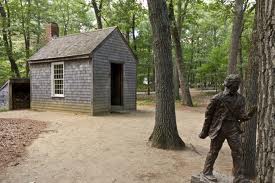Henry David Thoreau
by Edward Sydney Dunshee, used under ![]()
Henry David Thoreau was one of the most well-known Transcendentalist writers in the 19th century. His works influenced leaders, writers, and societies all around the world.
Henry David Thoreau was highly educated, yet he chose to live a simple life, rather than prosper in any field. Growing up on a farm, Thoreau valued close, family relationships. He later attended Harvard College and Concord Academy. Finding a love for literature, he taught for awhile, but eventually stopped due to his opinions of the public school system. He believed this system took away from individuality, so he continued to open a private school with his brother, focusing on curiosity and imagination. (Challman, 2008)
“I went to the woods because I wished to live deliberately, to front only the essential facts of life, and see if I could not learn what it had to teach, and not, when I came to die, discover that I had not lived.” – Henry David Thoreau
Thoreau later proved to be revolutionary with a drastic life change, spending years in isolation, in order to expand upon his creative impulses. Very firm in his beliefs, he was often looked upon as an anarchist. He relied on a great amount of reasoning to arrive at his beliefs. In his isolation, he communicated little with the outside world, even though he was only a few miles from it. (Rahn, 2008)
Thoreau then wrote about his time in isolation at Walden pond, later writing about those two years, two months, and two days in the work Walden. He raises ethical implications, speaking of society and the individual, and of sounds and silence, and body and spirit. (Conrad, 2009) There is a great plea for simplicity. He wishes others to live a simple life, while appreciating nature. Thoreau hoped to gain a better understanding of society through personal introspection. There could be great pleasure in escaping society, while avoiding gossip, fights, etc. One may be lonely even while in the company of others if one’s heart is not open. Here at the pond, Thoreau is “reborn” with nature. (Conrad, 2009)
Walden Pond
by Allahabad,India, used under 
Replica of Thoreau’s Cabin
by RhythmicQuietude, used under ![]()
In 1846, Thoreau was arrested and imprisoned for one night due to nonpayment of a poll tax. Creating imbalances, he purposely did not pay, in defiance of slavery and the Mexican War. This event led to one of his most famous works, Civil Disobedience. He states that one has the right and responsibility to stand up for one’s beliefs, while not blindly following laws and government policy. (About Thoreau, n.d.) He influences readers to break the law if it requires injustice to others, showing the difference between right and wrong.
Thoreau’s work had a “profound influence on reformers worldwide, from Tolstoy in Russia and Gandhi in South Africa and India; to Martin Luther King, Jr’s civil rights movement and the opposition to the Vietnam War in the United States; to recent demonstrations for civil rights in the former Soviet Union and China.” (About Thoreau, n.d.)
For more information
References
About Thoreau: Civil Disobedience | Walden Woods. (n.d.). About Thoreau: Civil Disobedience | Walden Woods. Silverscape. Retrieved April 10, 2014
Dunshee, E. (2010). Walden. [Digital image] Retrieved from http://en.wikipedia.org/wiki/File:Walden_Pond,_2010.jpg. Available under Creative Commons.
RhythmicQuietude (2010). Replica of Thoreau’s Cabin near Walden Pond. [Digital Image]. Retrieved from http://en.wikipedia.org/wiki/File:Replica_of_Thoreau%27s_cabin_near_Walden_Pond_and_his_statue.jpg. Available under Creative Commons.
Ptwo (2010). Walden. [Digital Image] Retrieved from http://en.wikipedia.org/wiki/File:Walden_Pond,_2010.jpg. Available under Creative Commons.



